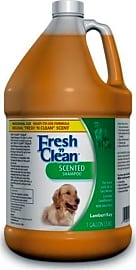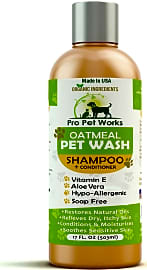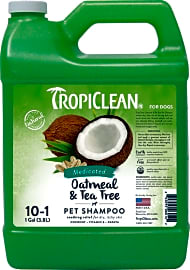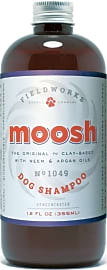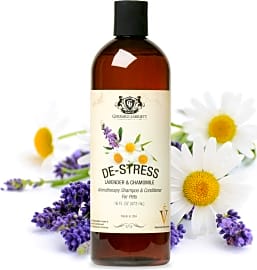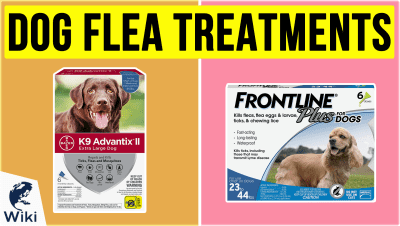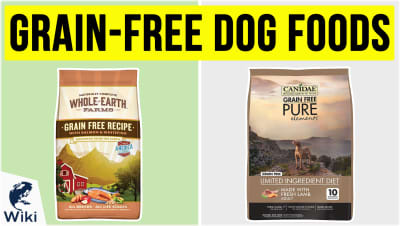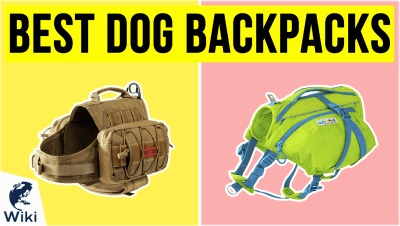The 10 Best Dog Shampoos

This wiki has been updated 37 times since it was first published in April of 2016. Because it isn't a good idea to bathe pooches daily, nor would most tolerate it, dog shampoos need to be made with ingredients that offer long-lasting effects and can keep a dog's coat looking clean and shiny for weeks between tub sessions. Our selection contain formulas that should be gentle on most canines, and can address issues like excess odor, matting, skin itchiness, and flaking. When users buy our independently chosen editorial selections, we may earn commissions to help fund the Wiki.
Editor's Notes
April 10, 2020:
We wanted our selection of dog shampoos to address both the more serious skin and fur issues pooches can face, like hot spots and allergies, as well as some of the less-severe but still troublesome problems, like odor and tangling.
First focusing on gentle formulas that could fight irritation rather than cause it, we added Earthbath Hypo-Allergenic, which is safe for most canines with allergies, fragrance-free, and relies on mild coconut cleansers to eliminate dirt buildup. K9 Pro Aloe & Cucumber is another hypoallergenic formula that can help fight itchiness and inflammation, while also making fur easier to brush. We removed Top Performance Fresh Pet because the manufacturer has added a warning label stating that one of its ingredients may cause reproductive issues, and we only want to present pure and safe products.
Odor control is always a nice perk with pet shampoo, which is why we like Lambert Kay Fresh N Clean, with its special scent technology that keeps Fido smelling good for weeks after bath time. Nature's Miracle Supreme Odor Control also snagged a spot because it can help with dogs giving off particularly pungent aromas. Pupkiss Pets All-In-One lost its place because its fragrance barely lasts a day after a bath. We also removed ThinkPlanet Natural because, even though humans may find the smell of the Citronella Oil pleasant, dogs are often repulsed by it, making it hard to convince Rex to stay in the bath while you use this product.
Anything that can help the battle against fleas wins points here. Though they are not officially flea treatments, TropiClean Oatmeal & Tea Tree may provide relief from the symptoms of a flea infestation, and 4Legger Organic can help repel the nasty bugs.
Special Honors
Rocco & Roxie Supply Co. Calm Sensitive Dog Shampoo Rocco & Roxie Supply Co. Calm Sensitive is gentle enough for a young puppy's delicate skin or for canines of any age facing skin irritation. It has soothing aloe vera and chamomile, as well as rosemary extract, which offers anti-inflammatory properties, but skips problematic ingredients like parabens and alcohol. It also contains honey extract that offers a mild and pleasant fragrance. roccoandroxie.com
MicoChlor Plus Antibacterial & Antifungal Shampoo This medicated shampoo contains Miconazole Nitrate and Chlorhexidine Gluconate, both of which can kill fungus that causes skin infections such as dermatitis and ringworm. The added aloe vera offers a cooling and soothing sensation on the skin, while the vitamin E and fatty acids hydrate the epidermis and help create a healthy coat. allivet.com
The Importance Of Bathing Your Dog
There is a long running debate over how often one should bathe their dog.
There is a long running debate over how often one should bathe their dog. Some feel that doing so rids a dog's coat of healthy oils and potentially dries our their skin. Others feel that bathing regularly is better. No matter which group you belong to, all agree that bathing a dog at least periodically is necessary and beneficial for both animal and owner.
Bathing a dog removes dirt, debris, urine, saliva, and variety of other contaminants from their coat. This will make a dog's coat smell and look better. It also minimizes matting, which can actually be painful for dogs. If you've ever had a ponytail that is too tight, you might have some idea of how your pooch feels when they have their hair all matted up. Bathing can also kill potentially harmful parasites and bacteria that irritate a dog's skin and lead to other health problems.
Just like in humans, sanitary conditions are better suited to healing than unsanitary ones. If your dog has inflamed or damaged skin, bathing will promote faster healing and help it to recover. It also helps to stop irritation, so they scratch less, further minimizing the possibility for additional skin damage.
Giving a dog a bath is the perfect time to check their skin for abnormalities, as well. Using your hands to massage the shampoo into their coat allows you to detect ticks or fleas, dry or irritated patches, and a range of other issues. Often times, catching these problems at an early stage prevents them from becoming more serious conditions. For example, you may notice that your dog's skin looks slightly irritated after switching to a new food, allowing you to switch back to their regular food before it becomes a full-blown skin condition requiring medical treatment.
Allergy sufferers will be happy to learn that bathing a dog can rid its coat of spores, pollen, mold, and other allergens that may be tracked into a home. Typically, these contaminants can't be removed by the simple act of brushing. By contrast, such an action may, in fact, be counterproductive by dispersing these allergens throughout your home. Some studies show that bathing a pet weekly reduces allergens in their coat by as much as 85 percent.
Choosing Between The Different Types Of Dog Shampoos
One of the keys to ensuring that bathing your dog is doing them more good than harm is by choosing the correct type of shampoo. Some will dry out their fur more, while others will be more gentle, but may not do as good of a job at killing bacteria and parasites. Your dog's needs and bathing schedule will help determine the best choice. Dog shampoos come in three main categories: chemical-based, natural, and certified organic.
On the plus side, they tend to have a longer-lasting scent and are very effective at killing bacteria and parasites.
Chemical-based shampoos are often the cheapest, but are potentially the most damaging to your dog's coat. They include ingredients like cocamidopropyl betaine, sodium lauryl sulfate, and petroleum, along with artificial colors and fragrances. Chemical-based shampoos will often dry out a dog's coat and skin the most, so they are best used on dogs that receive infrequent bathing. On the plus side, they tend to have a longer-lasting scent and are very effective at killing bacteria and parasites. For most though, unless your budget doesn't allow for a natural or certified organic shampoo, or you are using a specific medicinal shampoo on the recommendation of your veterinarian, chemical-based shampoos are best avoided.
Despite what many people think, natural dog shampoos are not necessarily organic. The term natural doesn't have a legal definition according to the FDA, so businesses are free to use it in their marketing without having to adhere to any guidelines. This means that a dog shampoo labeled as all-natural could potentially contain some chemicals. Most reputable companies, however, will use few if any chemicals in shampoos labeled as natural, so they can still be a good choice. Just make sure to read through the ingredients and be wary of any undefined terms, like natural oils or natural cleansers.
Unlike the term natural, the term certified organic does have a legal definition designated by the USDA. This means any dog shampoo labeled as certified organic must meet stringent guidelines. A certified organic dog shampoo will not contain any artificial ingredients, and any natural ingredients used must be grown without any chemical fertilizers or insecticides.
As a general rule of thumb, natural and organic shampoos are gentler on a dog's coat and better suited to frequent bathing schedules. They are also better for the environment.
Can't I Just Use Human Shampoo?
While it may seem easier to just grab your bottle of human shampoo and use it when bathing your pooch, this is a definite no no. Dogs and humans have very different skin, with one of the major differences being in the pH levels. All skin, both that on humans and dogs, has a thin layer known as the acid mantle. The acid mantle protects the stratum corneum, or the top layer of skin, from bacteria and other contaminants. It also plays a part in how well your body can absorb water, directly effecting your hydration levels.
During bathing, the acid mantle is washed away, so shampoo and soap manufacturers add moisturizers and other ingredients to protect the skin until the acid mantle is replenished. If skin doesn't have the proper pH balance, the acid mantle cannot do its job. Healthy human skin has a pH balance of between 4.5 and 5.6, which is slightly acidic. Healthy dog skin has a natural pH balance between 6.2 and 7.4, which is closer to neutral.
Using a human shampoo on a dog disrupts the skin's natural pH levels and interferes with the acid mantle's ability to do its job. This causes a dog's skin to be more vulnerable to bacteria, parasites, and viruses. It can also cause it to become flaky, dry, and irritated.




